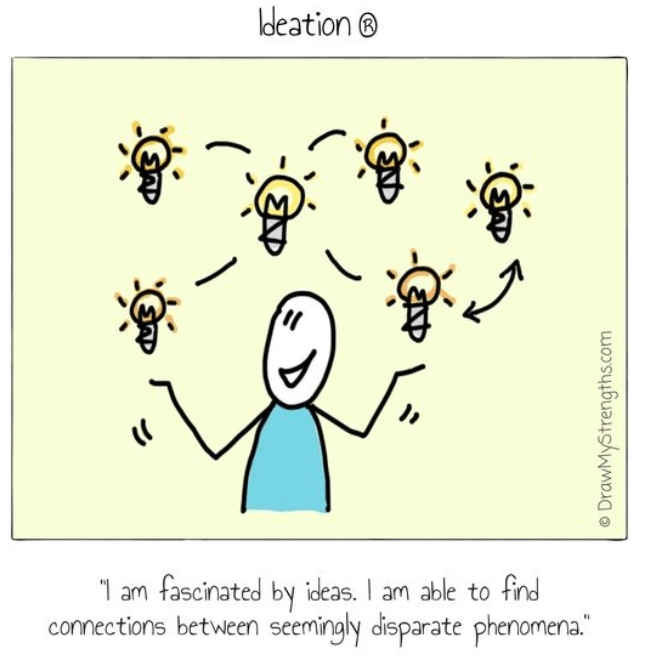I have always been drawn to the world of ideas. From a young age, I had a natural ability to come up with new and innovative concepts, and I found that I was always able to see connections between different things that others might not have noticed. I have many new ideas.
This is confirmed by when I took the gallup strengthsfinder test. My top strengths are Ideation, Strategy.
I have learnt how to improve this strength and develop it. Here are some ways to improve it:
- Continuously exposing yourself to new and diverse information and experiences
- Practicing brainstorming and other creative problem-solving techniques
- Collaborating with others and getting feedback on your ideas
- Learning about and studying successful examples of innovation in various fields
- Taking time to reflect on your own thought processes and identifying any limiting beliefs or biases that may be blocking your ability to come up with new ideas
- Being open to new and unusual ideas and not dismissing them too quickly
- Keeping a idea journal to capture and organize your thoughts.
However, as I grew older, I began to understand that my greatest strength – my constant generation of ideas – was also a big weakness. I often found myself getting caught up in an endless cycle of new ideas and ways to improve things, especially when I was deep into a task, and it became a challenge to focus on the task at hand.
I learned to overcome this by developing a few key habits. First and foremost, I learned to keep lists of ideas and to write them down on paper. This helped me to organize my thoughts and to keep track of the ideas that were truly worth pursuing. And by writing them down on paper I am able to let go of them.
Additionally, I realised the importance of being very disciplined and focused when it came to managing my time. I began to use time-boxing techniques, where I would set aside specific blocks of time each day to focus solely on generating new ideas and other activities. This helped me to stay on task and to avoid getting caught up in the endless cycle of ideation.
It’s important to mention that for many other people their strengths and weaknesses are often tied to each other or connected. For example, someone who is highly organized may be a great project manager, but may struggle to be spontaneous and adaptable. Or someone who is a great public speaker may be overbearing and not a great listener, for example. Understanding these connections and being aware of them can help in personal development and in working with others.
In conclusion, my ability to generate unlimited ideas has been a massive strength for me, but it has also been a weakness that I have had to learn to manage. By developing a few key habits and being aware of the connections between my strengths and weaknesses, I have been able to harness my strengths and overcome my weaknesses. And as for many other people, understanding these connections and being aware of them can help in personal development and in working with others.
What is your biggest strength and weakness?
https://www.gallup.com/cliftonstrengths/en/254033/strengthsfinder.aspx
